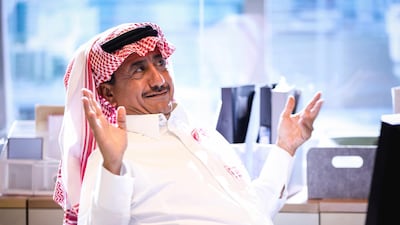The future of Arabic-language cinema and television is in Saudi Arabia, according to one of the kingdom’s leading actors.
Nasser Al Qasabi, known for his seminal television shows Tash Ma Tash and Selfie, posted this message on Twitter this week, triggering a spirited discussion with Saudi followers and cultural figures.
In a thread that is both whimsical and optimistic, he predicted that within the next 20 to 30 years, Saudi Arabia will be leading the Middle East’s film and TV scene, in the way that Egypt, Lebanon and Syria have done over the past century.
The reason for his confidence, he said, is down to the bold vision laid out by Saudi Arabia's Minister of Culture Prince Badr bin Abdullah bin Farhan for evolving the kingdom's creative industries.
Al Qasabi suggested that if the country's music artists and composers had already achieved regional popularity without official governmental support, the future is bright for film and TV creatives as the nation attempts to position itself as a regional production hub.
“Due to individual creativity, Saudi music has been able during the past 50 years (by self-effort) to achieve milestones and reach the Arab listener, unlike theatre and television drama, which has remained weak,” he wrote.
“And, as Egyptian cinema dominated throughout the last century, Lebanese TV drama shone during the '60s and '70s, and Syrian drama flourished in the '90s, I see Saudi drama will be the most prominent and dominating the Arab street in the '40s and '50s of this century.”
Local and timely content
Al Qasabi's tweets set off a flurry of debate, with more than 300 posts discussing ways to elevate Saudi Arabia's entertainment industry.
Saudi actor Badr Khaled saluted his colleague's optimism. "God willing, it will come true," he said. "With our leader, the change and the renewed revival is possible."
Meanwhile, Saudi cultural commentator Abdul Rahman Al Naser said Al Qasabi's vision doesn’t go far enough.
“Long years away and an alarming distance of time,” he said. “Let us dream in the present rather than the future.”
Some of the more insightful commentary came from Al Qasabi’s Saudi followers, who provided suggestions for improving the quality of content created in the kingdom.
“Saudi cinema and television cannot develop without making plans and not following through on them,” said Nouf, a self-described film and book lover.
“We need batches of trained actors to create new characters with different personalities. The reason why Egyptian and Lebanese cinema and television succeed is due to their arts institutes and inquiry into the art form. The Saudi drama remains unfocused.”
Twitter user Neiallo stated that for Saudi Arabian productions to resonate with viewers, the material needs to be polished and timely.
“In order for the Saudi drama to succeed, we must return to reality (based stories),” she said. “Most successful global productions are fictional and this requires enormous (financial and creative) resources. This is difficult at the present time, but returning to reality – local and folk stories – is a fertile field for creative Saudi drama.”
Education at the heart
Al Qasabi's initial tweet was inspired by the Saudi Culture Minister's column for Arabic newspaper Asharq Al Awsat, where he laid out his plans to strengthen the industry output, both quantitative and qualitative, as part of the Saudi Vision 2030 strategy.
Education, said Prince Badr, will be at the forefront when it comes to raising the next generation of Saudi creatives.
“We are also working on the 'learn for life' policy that aims to develop cultural capabilities,” he said.
“The effort is taking place in cooperation with several partners in all fields and cultural bodies will indeed march forward to continue to create teaching and training opportunities in all cultural specialties in order to develop the rich talents in our country and offer the highest quality options to our citizens.”


